The tricky questions facing Trump’s nominees
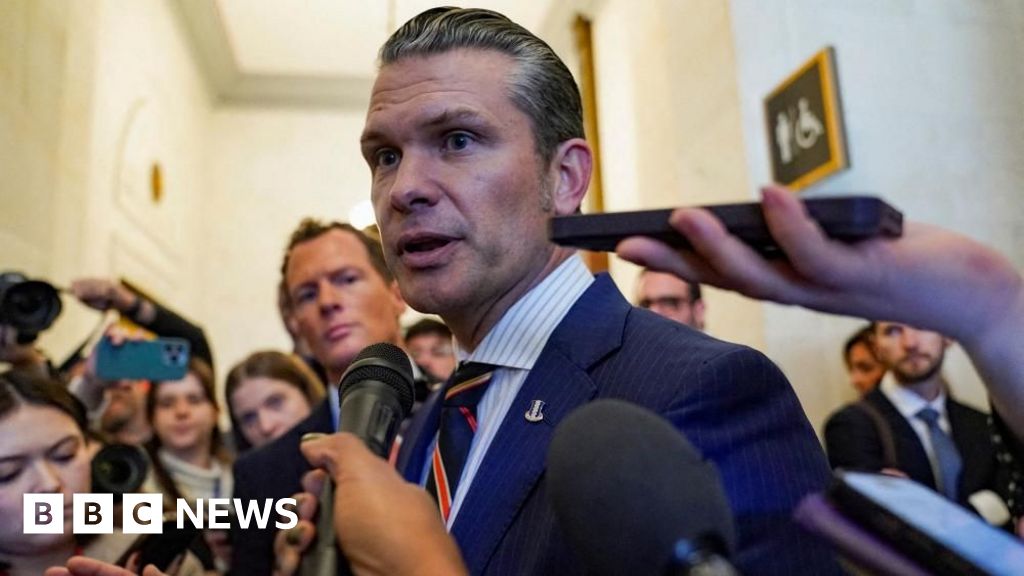
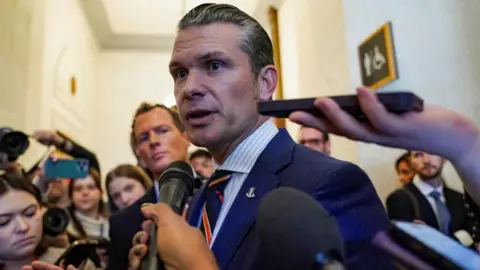 Reuters
ReutersSome of Donald Trump’s key allies will face a grilling by senators this week, as part of a process that will see them either approved or rejected for the roles the president-elect has nominated them for.
The hearings, which begin on Tuesday, are the first chance for senators to publicly quiz some of Trump’s more controversial picks.
Nominees then must be confirmed by a vote. And while the upper chamber of Congress is now controlled by Trump’s Republican Party – just three defections could be enough to deny a nominee a job.
Here are some of the difficult questions those nominees are likely preparing to face.
Pete Hegseth – defence secretary
One of the first confirmation hearings is set to be one of the most closely watched.
Trump’s nominee for defence secretary is expected to face questions on Tuesday about his lack of management experience and his alleged heavy drinking.
Senators could ask Hegseth about an accusation that he sexually assaulted a woman in a California hotel room in 2017, according to Politico.
Hegseth denies that claim and maintains the encounter was consensual. The allegation was investigated, but Hegseth – a military veteran and former Fox News host – was never arrested or charged.
Hegseth and the unnamed accuser then reached a confidential financial settlement in 2023. His lawyer later told the Associated Press that the payment was intended to prevent a baseless lawsuit.
Trump stood by his pick, who is among the nominees busy courting senators in recent days to try and shore up the necessary votes.
Rival Democrats on the committee also plan to pick up on Hegseth’s previous opposition to women serving in combat roles in the military, US media reports say.
Kristi Noem – homeland security secretary
In the spotlight on Wednesday will be the woman who could be tasked with carrying out one of Trump’s top campaign pledges – billed by his team as the largest mass deportation of illegal immigrants in American history.
As the president-elect’s choice for homeland security secretary, Noem could be quizzed on the practicality of enacting this pledge. A mass deportation programme on the scale proposed would likely face logistical or legal difficulties, experts say.
Noem could also face questions on other potential immigration policies, such as Trump’s vow to end birthright citizenship.
She has been a loyal and vocal backer of the president-elect’s pledges, which is consistent with other nominees and appointees for Trump’s second term in the White House.
Marco Rubio – secretary of state
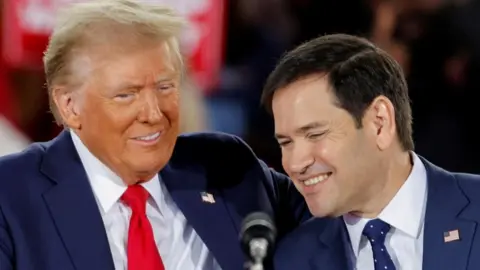 Reuters
ReutersThe man picked to lead Trump’s foreign policy agenda was once on the other side of a confirmation hearing for a Trump nominee for secretary of state.
During the session in 2017, he needled Rex Tillerson – urging him to describe Russian President Vladimir Putin as a war criminal which Tillerson refused to do.
If that session signalled a divergence in views between Rubio and Trump – who were then rivals – the two appear much more closely aligned eight years later.
Rubio is now in the frame for one of the most coveted jobs in Trump’s administration and is expected to encounter relatively little resistance in his path to confirmation.
But senators on Wednesday could test his loyalty with a line of questioning about future American support for Ukraine in its war against Russia. Trump has cast this as a drain on US resources – a view that could jar with Rubio’s hawkish views on foreign policy.
Howard Lutnick – commerce secretary
Another nominee facing a possible test of loyalty to Trump in his Senate committee hearing (which is yet to be scheduled) is one of the officials who would be tasked with delivering Trump’s sweeping tariffs.
Trump has threatened import taxes on a variety of goods arriving in the US – including from some of its top trade partners – in what he says is as an effort to protect US jobs.
Lutnick, the billionaire chief executive of financial firm Cantor Fitzgerald, has embraced this proposal – despite this position being at odds with others in his industry and some leading economists.
He is likely to face direct questions over the impact of sweeping new tariffs on the US economy and consumers.
Tulsi Gabbard – national intelligence director
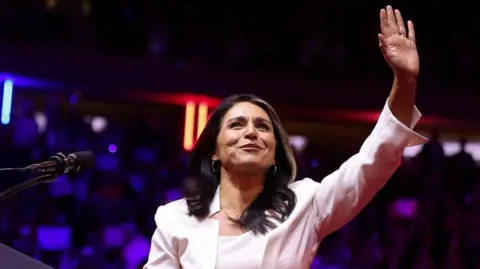 Reuters
ReutersTrump’s choice for national intelligence director could be asked by Republicans and Democrats alike about her past comments on American adversaries such as Russia and Syria.
Gabbard, another military veteran, has routinely opposed American interventionist foreign policy. In 2017, while still Democratic congresswoman, she met the then-president of Syria, Bashar al-Assad, and cast doubt on US intelligence assessments blaming him for using deadly chemical weapons.
And after Russia launched its full-scale invasion of Ukraine five years later, she blamed Nato and echoed a Kremlin claim that there were US-funded biolabs in Ukraine.
Gabbard has spoken of the necessity of talking to countries such as Russia.
Democrats are reported to be delaying her hearing until background checks are complete.
Robert F Kennedy Jr – health and human services secretary
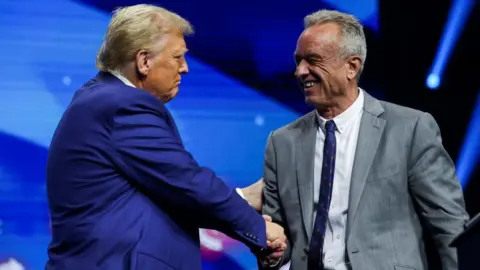 Reuters
ReutersOne of Trump’s most unconventional picks has, like Gabbard, been on a political journey that actually began in the Democratic Party.
Kennedy has since become a supporter of Trump and has been rewarded with this nomination.
He has no medical qualifications – which could present a tricky initial line of questioning from both sides of the political divide.
And his past statements on established science could also be put under scrutiny. He has repeatedly stated widely debunked claims about vaccine harm, but has denied being anti-vaccine more generally.
On other issues – such as scrutinising food additives – Kennedy enjoys broader support.
Kash Patel – FBI director
Some critics of Trump’s pick to lead the FBI have voiced doubts that Patel is qualified to run America’s main law enforcement agency. Others have shared concerns that he could work to exact revenge on Trump’s opponents.
“We’re going to come after the people in the media who lied about American citizens, who helped Joe Biden rig presidential elections,” he has previously said, citing a baseless Trump claim about the 2020 election.
Although former law enforcement officials have questioned his ability to lead the agency, Patel’s experience as a lawyer and in a number of national security roles has been praised by Trump’s team and some Republicans.
Patel has a stated aim to dramatically refashion how the FBI works, including with a clear-out of some of its top staff.


North America correspondent Anthony Zurcher makes sense of US politics in his twice weekly US Election Unspun newsletter. Readers in the UK can sign up here. Those outside the UK can sign up here.
Related
U.S. economy adds jobs as federal layoffs and rising unemployment…
Julia Coronado: I think it's too early to say that the U.S. is heading to a recession. Certainly, we have seen the U.S. just continue t
The job listing site highlighting H-1B positions so Americans can…
A mysterious new job listings website recently went live, solely showing roles companies want to offer to their H-1B holders seeking Green Cards in an attempt t
Tepid February Jobs Report Boosts Odds of a June Fed…
Federal Reserve Board Chairman Jerome Powell speaks during a news conference. Photo by Chip ... [+] Somodevilla/Getty Images.Getty Images The February jobs repo
French university offers jobs to American scientists afraid of government…
As the current federal government in the U.S. has been freezing or cutting funding for several research grants, a French university has stepped in with an offer














